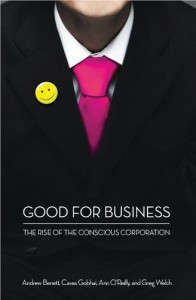Livesey, Sharon M, & Kearins, Kate. (2002). Transparent and caring corporations? A study of sustainability reports by The Body Shop and Royal Dutch/Shell. Organization & Environment, 15(3), 233-258
Abstract from author
This article analyzes sustainability values reports published by The Body Shop International and by the Royal Dutch/Shell Group. The authors show how corporate discourses expressed in these precedent-setting texts both reflect and influence sociopolitical struggle over the meanings and practices of sustainable development. Specifically, the authors examine metaphors of transparency and care used to describe corporate rationales for increasing stakeholder communication, including reporting. Drawing on distinct discursive domains of business accountancy and personal ethics and sentiment, these metaphors promise to reconstruct the interface between the firm and society. Exploring the quite different assumptions on which each of these metaphors relies and their implications for corporate practices of sustainable development, the authors consider whether sustainability values reporting and the dialogue that it claims to facilitate can promote more democratic and socially and environmentally responsive corporate decision making, even as they impose new forms of managerial control.
To read entire article, click here.
The authors also presented a conference paper about The Body Shop and Royal Dutch Shell entitiled (Be)Coming Clean: Sustainable Developement Accounting as Social Construction of Greening in 2001.
Abstract from authorThis paper addresses corporate public reporting efforts of two very different companies, The Body Shop International and Royal Dutch/Shell Group, both cited as pioneers in producing “values” or “social” reports. These are early examples of an emerging report genre so-called “triple bottom line” or “sustainable development” accounting that aspires to integrate social, environmental and financial performance indicators. Our post-structuralist analysis closely examines the texts of reports by each company to show how they restore the progress myth and its narrow economic paradigm in order to deconstruct the polarity between profits and principles. Thus, they construct new premises for sustainable (i.e., legitimate and competitive) business practice. The reporting examples we choose serve different corporate motives and goals for the two companies involved; nonetheless the reports themselves share common characteristics and strategies particularly, the interpolation of sentimental discourses of “caring” and “passion” with more rationalist discourses of business economics and accountancy. Thus, they attempt to articulate connections between distinct and previously incompatible discourses, between modernist sensibilities and those that challenge them. Broadly speaking, we argue that these new forms of corporate reporting constitute a micropractice of sustainable development, a currently emerging discursive domain. In this respect, the evolving genre plays a significant role in the constitution of knowledge about the environmental problematic and institutionalization of corporate behaviors that will count as environmentally and socially responsible and responsive. Accordingly, it bears investigation for its ontological and disciplinary force, including its capacity to potentiate more democratic decision-making and communication, as well as new forms of managerial control.
Read the full article here.


 How is IKEA able to offer its wide range of functional furniture at such affordable prices? This book, Values-based service for sustainable business : lessons from IKEA, looks at how the values-based business model of IKEA has helped it sustain its profitable while still fulfilling its corporate social and environmental responsibility. Other values-based service companies, like Starbucks Coffee Company, Swedish clothing retailer H&M (soon to set up shop here in Singapore) and Body Shop are analysed for comparison.
How is IKEA able to offer its wide range of functional furniture at such affordable prices? This book, Values-based service for sustainable business : lessons from IKEA, looks at how the values-based business model of IKEA has helped it sustain its profitable while still fulfilling its corporate social and environmental responsibility. Other values-based service companies, like Starbucks Coffee Company, Swedish clothing retailer H&M (soon to set up shop here in Singapore) and Body Shop are analysed for comparison.
